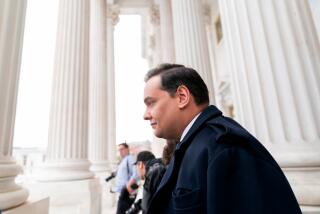Why the President Is Riding High
Why have damning revelations failed to hurt Bill Clinton’s popularity and even increased it? Most theories, and there are hundreds, overlook two central features of our political environment: the public’s entrenched distrust of government power, and Clinton’s remarkable ability to appear personally detached from the government he heads.
Put the two together and it’s easy to identify one reason Clinton’s approval rating has soared. He’s perceived as a victim of snooping belligerents prying into matters most Americans think should be private.
What’s more, his main victimizer is a federal cop armed with wiretaps, subpoena power and legal trickery, not to mention a gaggle of government lawyers and FBI agents. Kenneth Starr even looks like the stereotypical G-Man, a steely-eyed enforcer most Americans would be loath to have examine them.
The entire Starr procedure violates Americans’ innate sense that sexual impropriety ought to be dealt with by the family, not the government-media combine. There’s not even news value: Everyone knows politicians screw around and lie about it.
Sensing this, the White House has gone on the offensive, with spokesmen invoking against Starr Lord Acton’s dictum about power corrupting. Ironically, then, Clinton benefits from the public cynicism and hatred of government he has so often decried.
Spying and intimidation, key features of the Lewinsky investigation, are how the leviathan state maintains its unjust control over the country. In the war on drugs, the government has abolished a host of rights once taken for granted, and the tax police now know every detail of our finances and scrutinize every dime we spend.
Nothing is more disgusting than the rise of the federal sting operation, complete with informants and plants and grants of immunity for turncoats. They trick you into breaking some technicality and then threaten to lock you up with a bunch of rapists unless you turn in all your friends. It’s a Soviet tactic.
Starr had planned to wire Monica Lewinsky so she could trick Bill Clinton and Vernon Jordan into incriminating themselves. If it had worked, Clinton might be even more popular. Sting operations have run wild. The mild-mannered customer in the gun store could be an ATF agent. The scruffy guy trying to rent an apartment could be a HUD “tester.” The unruly crowd demanding quick service at a busy restaurant could be planning an EEOC class-action suit.
Every dissident political movement is littered with federal cops. Who hasn’t wondered, after expressing a hard-nosed opinion on the phone, if they are listening? Our worst nightmare is our best friend, to whom we confided intimate details of our life, spying on us for some monstrous federal agency.
And what is this “subpoena power” anyway? Can any American be dragged into the Starr chamber and told to confess all, on penalty of jail for getting some small detail wrong? One day Betty Currie was a loyal secretary; the next, she was forced to remember things she’d sooner forget. Is this our future as well?
In decrying Starr’s power and tactics, the White House taps into massive public resentment of the government. The message is: Just as the feds invade your life, family and finances, Starr is intruding into Clinton’s marriage and trying to make vice a hanging offense.
How can a head of state get away with such a tactic? Like Ronald Reagan, Clinton has mastered the art of presiding over big government while seeming to be separate from it. He reinforces this when he brags about cutting government back to its smallest size in generations. That this is sheer nonsense doesn’t matter; it’s impressions that count.
The big-media pile-on also has helped Clinton. They use the excuse of Clinton’s sex practices to pour filth into our homes. Why must we hide the morning newspaper from the kids? Do we really need network broadcasters discussing sexual techniques on prime time?
The American people’s revulsion at the government-media cartel is understandable, but it misses a crucial distinction. Government, particularly the presidency, needs to be policed; it’s the rest of us who don’t. But so long as he can keep pretending to be part of the rest of us, roasting on a federal spit for vices not crimes, Clinton will get public sympathy. Look who’s after him.
More to Read
Get the L.A. Times Politics newsletter
Deeply reported insights into legislation, politics and policy from Sacramento, Washington and beyond. In your inbox three times per week.
You may occasionally receive promotional content from the Los Angeles Times.










